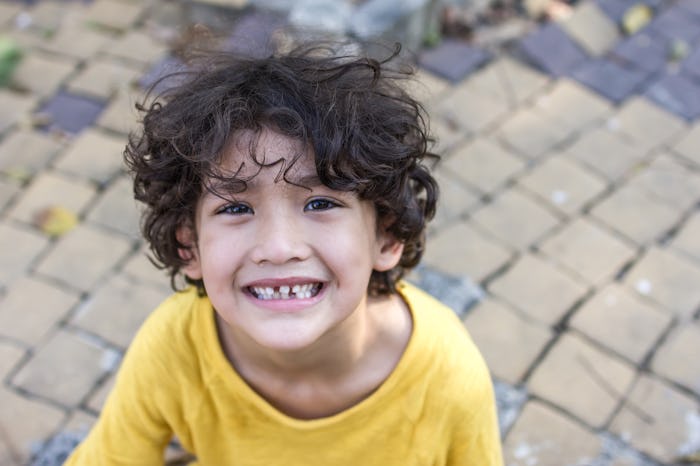I'll never forget the first tooth I ever lost — literally, I lost it. I was playing in the pool while on vacation with my family at Disney World. Without my knowing, my tooth fell out, sank to the bottom of the pool and was lost forever. My six-year-old logic told me that the Tooth Fairy would be upset, so I wrote her a letter begging for forgiveness. But, how old are kids when they lose their teeth? I was six years old, going into first grade. And now, I have a six-year-old first-grader of my own who has shown no signs of any loose teeth.
Is it normal for a first grader to show no signs of any lost teeth? "Most children start losing their baby teeth at around age five," Dr. Ron Baise, a pediatric dentist with over 30 years experience caring for children's teeth, tells Romper. Kids usually start with the two front teeth, also called the incisors. While the incisors are typically the first to go, molars will fall out around seven or eight years old. Dr. Eric Wood Jr., the lead pediatric dentist at Smile Brands, Inc., tells Romper that most kids begin to lose their teeth around six years old, but it depends on the child. "Sometimes girls lose their teeth a little younger, possibly around five," he explains.
Other dental milestones are also happening when your kid is about 5 or 6.. "Generally around this same time, the child will start getting their first permanent molars in the back of each corner of the mouth. These are also known as six year molars," explains Kelly Hancock, a registered dental hygienist and blogger at Toothbrush Life. But what if your child is like mine? A first grader with no loose teeth at all? Every week my son will ask me when is he going to lose a tooth. And honestly, I don't know what to tell him when all his classmates are coming into school with adorable toothless grins.
While Dr. Blaise says it's very rare, "some people only have one set of teeth. If this is the case then their first set of teeth simply won't fall out." If your child has not lost any teeth by the age of eight, then Dr. Blaise recommends bringing your child in to see the dentist.
"Genetics play a key factor in the age a child will lose teeth and if they may not lose primary teeth at all," says Dr. Wood. If this is the case, your child's dentist can conduct an X-ray to see if they do in fact have a second set of teeth. "They could be congenitally missing a permanent tooth which would cause them to not lose the baby teeth. There could also be a cyst in the way," says Hancock.
However, if things seem to be looking good, here's how to tell if your child is about to start losing those baby teeth. Dr. Blaise says, "Children will usually notice wobbly teeth about 2 weeks before they eventually fall out," which can sometimes feel uncomfortable for our little ones, making them tempted to play with their loose tooth. You may also notice your child has difficulty eating; this could be another sign of a loose tooth. There can even be "pain, discomfort or discoloration," says Dr. Wood.
If your child seems nervous about losing their teeth, Dr. Wood says "the best thing to do is educate them. You can talk with them about it beforehand and there are some wonderful children’s book and YouTube videos that help explain the process in a child friendly way."
"Kids are usually excited to lose their first teeth. The excitement of the tooth fairy is usually enough to have the child want to wiggle their teeth out," says Hancock. Plus, seeing all their friends lose their teeth could help with any feelings of distress of what's to come. Dr. Blaise says, "If children see their friends losing teeth as well, they are far less likely to be nervous about it."
Losing your first tooth is an exciting time, so get your kid psyched up for the Tooth Fairy — if that's your thing. But, if you're concerned about your child's dental health, then always check in with their dentist to make sure everything is right on track.
